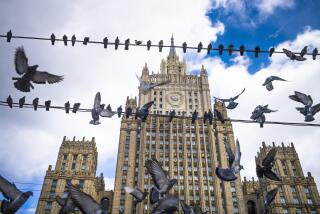Baker Concedes That Mideast Goals Still Eluding Him
DAMASCUS, Syria — During the end of his third frustrating tour of the Mideast in six weeks, Secretary of State James A. Baker III conceded Wednesday that he is still far from persuading Syria and Israel to begin peace talks.
Although Baker sought to put the best possible face on his meetings in Damascus, he showed flashes of irritation at the plodding diplomatic pace.
Twice during a joint news conference with Syrian Foreign Minister Farouk Shareh, Baker talked wistfully about abandoning his effort to bring Israel and its Arab adversaries to a bargaining table where they could try to end decades of hostility. Each time, he concluded it was not time--yet--to throw in the towel.
He insisted that he believes Arabs and Israelis are exhibiting a new readiness to grapple with the region’s problems in the wake of the Persian Gulf War.
“If I didn’t, I don’t think I would still be out here,” Baker said.
Nevertheless, he was unable to cite specific examples of progress after meeting for almost 10 hours Tuesday with Syria’s hard-line president, Hafez Assad.
For his part, Shareh made it clear that Damascus has not compromised on any of its procedural differences with Israel. The Syrian foreign minister said his government wants the proposed conference to be a continuing one with a major contribution from the United Nations. Israel is demanding a one-time conference to provide a ceremonial opening for later one-on-one talks. And the Israelis object to more than token participation by the United Nations.
As Baker and Shareh concluded their joint news conference, they inadvertently produced a snapshot of the problems Baker faces in his attempt to smooth over decades of hostility.
In what was intended as a concluding statement, Baker said the negotiations were making progress despite “some very, very difficult problems.”
Shareh then added his own summation: “I agree with Secretary Baker: There is some progress achieved . . . and I think there is also a long way to go, and the difficulties and obstacles remain in Israel.”
“That’s not exactly what I said,” Baker remarked dryly.
Nevertheless, Baker was sharply critical of the Israeli authorities for permitting the start of a new Jewish settlement in the West Bank. The trailer house outpost was begun Tuesday, in a defiant gesture toward the Baker mission.
“We were very disappointed to learn this morning that there is yet another new settlement that has been established in the occupied territories, and I think that probably points out rather vividly the fact that it is easier to obstruct peace than it is to promote it,” Baker said.
Later Wednesday, Baker flew to Kislovodsk, a remote spa town in the Soviet Caucasus Mountains, for talks with Soviet Foreign Minister Alexander A. Bessmertnykh.
Baker said he would urge the Soviets to join him in trying to persuade Israel and its Arab adversaries to sit at the same negotiating table.
The Baker-Bessmertnykh talks are scheduled for today. Later, the secretary of state will return to Jerusalem for meetings with Prime Minister Yitzhak Shamir.
Like Assad, Shamir has given no hint that he will agree to the compromises that Baker believes are necessary to make the proposed conference possible.
More to Read
Sign up for Essential California
The most important California stories and recommendations in your inbox every morning.
You may occasionally receive promotional content from the Los Angeles Times.









